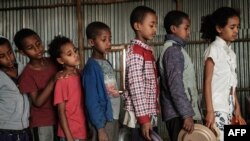U.N. aid agencies warn of a looming humanitarian catastrophe in northern Ethiopia’s battle-scarred Tigray region if they are prevented from delivering life-saving assistance to this stricken area.
The Ethiopian government’s tenuous unilateral ceasefire in Tigray after eight months of conflict has not got off to a good start. The U.N. refugee agency reports the electrical power and phone networks in its offices in the capital Mekelle are not functioning, hampering its ability to deliver humanitarian aid.
The U.N. children’s fund has condemned the pillaging of its video equipment Monday by members of the Ethiopian National Defense Forces, warning 140,000 acutely malnourished children were at risk of dying without urgent nutritional treatment.
The World Food Program is demanding full access to Tigray to deliver life-saving food assistance to millions of hungry people. Among them, it says, are half a million children, women and men who face starvation over the coming months.
The World Health Organization reports the region’s health system has collapsed. WHO spokesman, Tarik Jasarevic, says WHO can do little to help the beleaguered population because access to the area is extremely limited.
“We are obviously concerned about potential for cholera, measles, and malaria outbreaks in the region. In addition, Tigray region is also located on the meningitis belt and is at risk of yellow fever outbreaks… People are also at risk of death from lack of access to health services to treat any other diseases that may happen,” he said.
Despite the cease-fire, fighting continues in Tigray. Jasarevic says WHO is taking measures to strengthen the security and wellbeing of its staff. He says efforts to provide essential health care is ongoing where it is possible to do so. However, he adds, what WHO staff can do does not approach the enormity of the needs.
“Now, with hospitals that are barely functioning, people being displaced, and the looming famine, the risk of communicable and vaccine-preventable diseases spreading due to the lack of food, clean water, safe shelter and access to health care is very real. All these factors combined are literally a recipe for larger epidemics,” he said.
WHO reports an estimated 3.5 million people are at risk of cholera. It says six million people are vulnerable to malaria, especially malnourished children. It says they are at particular risk of dying from this deadly vector-borne disease.
An oral cholera vaccine campaign targeting two million people, which began on June 12 was only able to reach 50% of the targeted population. WHO reports this was due to the conflict and difficulty in reaching the region’s widely spread population by road.
The agency reports attacks on health care, the looting and destruction of cold chain — the system used for storing vaccines correctly — and the general dangers posed by the warring parties has had a harmful impact on this life-saving operation.




